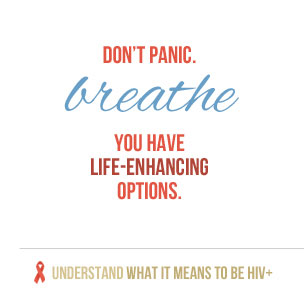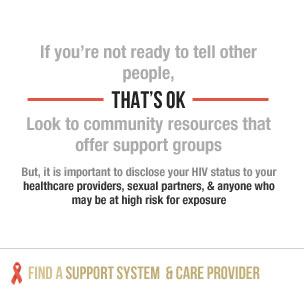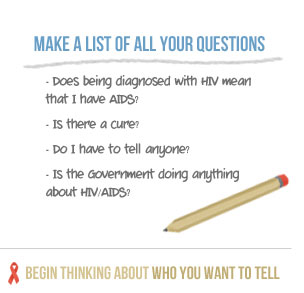Newly Diagnosed Checklist
Being diagnosed with HIV can be a scary thing to face. You may have a lot of unanswered questions and concerns. This checklist will help you take the first steps toward managing a new HIV diagnosis.
- Don’t panic—just breathe. This is life-changing news but you have life-enhancing options.
- Make a list of all your questions. You will probably have some time between when you are diagnosed and when you have your first visit with an HIV specialist or healthcare provider. This might be a good time to sit down and write out a list of questions about your new diagnosis.
Making a list is a good way to organize your thoughts. No question is too vague, too detailed, or unimportant. You may find the answers to some of these questions through your own research, and some may need to be answered by your healthcare provider. - Understand your diagnosis. After you have listed your questions, take some time to understand what it means to be “HIV-positive.” You can visit government and private websites, read printed materials (from the testing center or local library), talk with healthcare providers, or take advantage of community resources.
- Find a support system. This is one of the most important pieces of managing a new HIV diagnosis. You can find support among friends, family, or members of your community.
If you are not ready to tell other people about your HIV diagnosis, that’s ok. Look to community resources and professional organizations that offer support groups for newly diagnosed people, one-on-one counseling, peer counselors, or health educators. - Find a care provider. Your care provider will be the person who partners with you to manage your HIV care. That person will be responsible for monitoring your laboratory results, working with you to develop a proper treatment plan, advising you on health-related matters, and caring for your general health and well-being.
This clinician, usually a doctor or nurse practitioner, will be your partner in your healthcare. It is important to maintain an open and honest dialogue with your care provider. Sometimes a care provider will be recommended to you at the time of your diagnosis, or you will receive a referral from the place that conducted your HIV test. In some cases, you may need or want to find a provider on your own. - Prepare for your first appointment. Your first appointment with your HIV specialist can cause anxiety. Remember to bring your list of questions and be open and honest with your clinician. Take some time to research the medical tests that your clinician may want to run during your first visit.
- Begin thinking about who you want to tell. Disclosing can be one of the hardest parts about managing a new diagnosis of HIV. It’s important to remember that you do not need to tell everyone all at once, and that there are systems in place to help you.
At this time it is important to disclose your HIV status to your healthcare providers, sexual partners, and anyone who may be at high risk for exposure. Please see the section entitled Talking to Others About Your HIV Status.
For more information, see VA’s Just Diagnosed.
See also NIH’s Newly Diagnosed.
Additional Resources
- Department of Veterans Affairs - HIV/AIDS: Just Diagnosed Guide
Last revised: 04/07/2011



